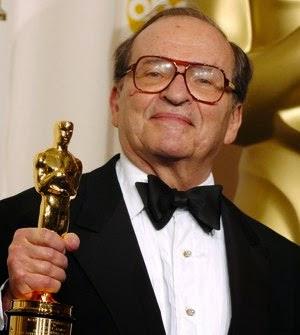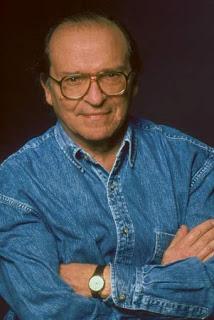
April 9th will mark the four year anniversary of director Sidney Lumet's passing, at age 86. Lumet was the first director I interviewed whose one-sheet posters hung on my wall as a kid. He was an idol, an icon, and an inspiration. I wasn't yet 30 in April 1997, when I met him at The Four Seasons Hotel in Beverly Hills for our interview at the press junket for "Night Falls On Manhattan," one of his solid, authentic urban dramas that blended crime, politics and personal revelations that became his signature.
Lumet immediately put any butterflies I had at ease. Diminutive, but with the infectious energy of a teenager, his was a disarming presence. He paid me a compliment on my sportcoat, saying that I looked a bit like the young Mickey Rourke (which I still don't see, but what the hell), then went on to regale me for an hour with stories about his remarkable life in the theater, the early days of live television, and of course in film.
The other indelible memory I have of that day is this, and it remains a potent lesson to me about the fragile, complicated and often mercurial personalities artists possess: another journalist who was waiting in the "holding room" for his turn with the maestro, a man whom Lumet obviously knew as he greeted him warmly, had brought his teenage son. The boy looked at Lumet in awe. Lumet smiled, shook the lad's hand, and asked about his interests. The boy replied "I want to be a filmmaker, and you're my hero." Lumet's entire countenance changed on a dime. He immediately broke eye contact with the boy, turned and hurried away, as if the kid had just spit in his face. I'll never forget that moment.
Lumet's body of work is one that will carry on for the ages, and remains one of the cinema's most diverse. It is unlikely, given the vast changes in the movie business since Lumet's entry, that another contemporary filmmaker will ever assemble one to rival it.
Thanks for it all, Mr. Lumet. April 9th of this year will be spent with a bearded Al Pacino, a raving Peter Finch, a haunted Rod Steiger, and a vulnerable Paul Newman, magnificent bastards all, reaching for that moment of redemption.
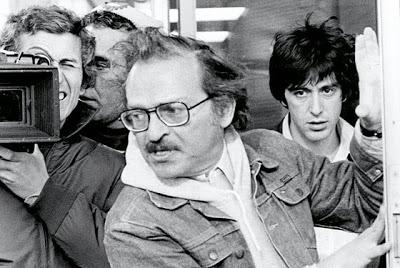 With Al Pacino, on the set of "Dog Day Afternoon," 1975.
With Al Pacino, on the set of "Dog Day Afternoon," 1975. Regarded by many as the finest motion picture director of his generation, Sidney Lumet's films have been nominated for over fifty Academy Awards. Born in Philadelphia in 1924 to parents who were veteran performers in the Yiddish theater, Lumet initially took to the stage as a child actor, making his debut on radio at age four and stage debut at the Yiddish Art Theater at five. He went on to appear in many Broadway plays, including "Dead End." He made his only film appearance at 15 in One Third of a Nation (1939). When WW II broke out, Lumet's career was put on hold as he did his U.S. Army service in India and Burma as a radar repairman from 1942-46.
Upon his return to the States, he organized an off-Broadway actors' group and became its director. During this time, he also directed in summer stock and taught acting at the High School of Professional Arts. In 1950, he joined CBS, where he soon won recognition as a gifted director of TV drama ("You are There," "Omnibus," "Best of Broadway," "Alcoa Theater," and "Goodyear Playhouse," among others). He was given his first chance to direct a motion picture with 12 Angry Men in 1957 when the film's producer and star, Henry Fonda, took a shine to the young director and his TV work. Thanks to his TV experience, Lumet was able to complete the tightly structured courtroom drama in 19 days on a budget of $343,000. With the help of cameraman Boris Kaufman, Lumet used the space restrictions of the cramped setting to advantage, generating uncommon tension from the claustrophobic confines of the jury room. The film and its director were nominated for Academy Awards. Lumet won the Director's Guild Award and the film was widely praised by critics. It would lay the groundwork for territory that Lumet would explore in many of his future films: humanity attempting to prevail amid cynicism and corruption in an urban, political setting with a righteous protagonist standing alone in this harsh world in which he is attacked from all sides, sometimes by those he loves and trusts the most. Lumet's work in the 1950s and '60s, in particular, turned the ideals of post-war Eisenhower America, with happy housewives vacuuming, husbands bringing home the bacon and "Keeping up with the Joneses" upside down, influencing generations of filmmakers and storytellers, including recent hits such as AMC's Mad Men.
Lumet received another nod from the DGA for his handling of Eugene O'Neill's Long Day's Journey Into Night (1962), on which he applied a masterful mix of static and dynamic camerawork, turning the play into a distinctly cinematic work with a classic performance from Katharine Hepburn in the lead.
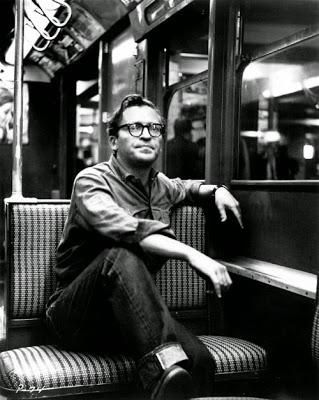 On the set of "The Pawnbroker," 1964.
On the set of "The Pawnbroker," 1964.Lumet's growing reputation was further enhanced by his intelligent handling of the Cold War thriller Fail Safe (1964), and his compassionate treatment of a complex psychological theme in The Pawnbroker (1965), the profoundly disturbing story of a Holocaust survivor's anguished existence in New York's Harlem amidst his burning memories of the concentration camps. After generating a powerful drama of the wretched life in a British military prison in The Hill (1965), the first of his four collaborations with star Sean Connery, which also included Murder on the Orient Express (1974) and the little-seen masterpiece The Offense (1973), Lumet's next big commercial splash came with Serpico (1973), the riveting true-life police thriller starring Al Pacino about an honest cop trying to expose widespread corruption within the NYPD. Lumet followed this classic with the equally-lauded Dog Day Afternoon (1975), again with Pacino in the lead in a story ripped from current headlines about a young Brooklyn man who robs a bank to pay for his lover's sex change operation. This was followed by another classic of the 70's, Network (1976), his greatest commercial triumph. Although the film, which was written by Paddy Chayefsky, was denounced by broadcasters and many critics as preposterously false, it was a huge moneymaker earned several Academy Award nominations, including Best Picture and Best Director. It won four Oscars in the writing and acting categories. Lumet next shared an Academy Award nomination for the screenplay of Prince of the City (1981), another true story of police corruption in New York. His subsequent films in the 80's received mixed notices, with the notable exceptions of the riveting The Verdict (1982) and Running on Empty (1988). In 1995, Lumet wrote the best-selling book Making Movies which is now in its seventh printing.
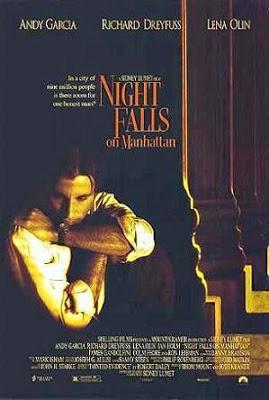
Lumet's 40th film, being released this month, is Night Falls on Manhattan, which Lumet adapted for the screen from Robert Daley's novel Tainted Evidence. The film explores familiar Lumet territory of political corruption, tough cops, and the mean streets of New York in telling the tale of one Sean Casey (Andy Garcia) an Irish-Puerto Rican former cop and wet-behind the-ears assistant D.A. who is thrust into the limelight after being chosen to prosecute a high profile, headline making case. As he moves deeper into the criminal justice system, Casey's world is torn apart, as he experiences personal and professional betrayal after discovering a crime and cover-up among those closest to him. Richard Dreyfuss, Lena Olin, Ron Leibman, James Gandolfini and Ian Holm give fine support in the large, emsemble cast. The film is a riveting drama, and ranks among Lumet's best work to date.
Although now in his early 70's, Sidney Lumet looks at least ten years younger and carries himself with the countenance and boundless energy of a man in his mid-20's. Mr. Lumet sat down recently in a plush suite at the Four Seasons Hotel to reflect on his prolific and distinguished career, and to talk about Night Falls On Manhattan.
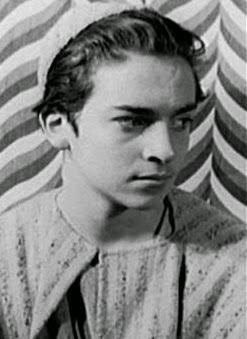 16 year-old Lumet starring in the play "Journey to Jerusalem, 1940."
16 year-old Lumet starring in the play "Journey to Jerusalem, 1940."How did someone who seemed to have a bright future as an actor, suddenly fall in love with directing?
SIDNEY LUMET: You know one of the things in everybody's life, and people always seem to think I'm kidding when I say this, luck has a tremendous amount to do with it. It's stunning to me how big a part luck plays in your life. I'd been an actor, and I was making a decent living, not great, but decent, and I was teaching--I'd set up the drama course at the High School for the Performing Arts--and a friend of mine, Yul Brynner, was directing for television at that time, and a wonderful director by the way. And Yul said (imitating him)'Come on over! Nobody knows what they're doing. It's great fun! You'll make good living!' And so I went into CBS as Yul's a.d., his assistant director. And then when Yul left to do "The King and I" on Broadway, I took over the show, which was a melodrama called "Danger." It was a half hour show every Tuesday. So I really just fell into it. I did that for some months. Then I started doing more shows from there.
Henry Fonda was apparently instrumental in bringing you onto 12 Angry Men. How did the two of you hook up originally?
Again, luck. I had worked with Reggie Rose, who wrote the script, on "Danger." We had done some of Reggie's first scripts. He always liked what I did with his work. So when the movie came up--I had not done the original television show--Reggie wanted me to do it. Before I began directing, I and another group of actors had formed a workshop off-Broadway. And we'd be there doing exercises, vocal exercises, physical exercises, and work on scenes. And I had done some directing there, that's actually where I started directing. There wasn't an official director in the group, but somebody had to say 'You go over here,' 'You do this,' So I started doing it...and at the end of every year, we tried to find a new American play that we would mount in a workshop format...now, we're talking about luck again. One of the actors in the workshop, a guy named Joe Bernard, was also in "Mister Roberts" at the time on Broadway...when it came to the year end project, Fonda came down to see him. Two or three years later, Reggie brought (Fonda) 12 Angry Men and mentioned my name to direct, and Fonda said "Oh yeah, I remember him. I saw something he did down in the Village two or three years ago that was extraordinary! Yeah, I think he could do it." And that was it. Again, talk about luck!
How did you build and then maintain the tension in 12 Angry Men since you were working in such a confined space on such a tight schedule. Was it what you did with the actors, was it camerawork...
A combination of both. Technically it's an enormously complicated movie. You'd think that shooting in a tight space would be the easiest thing in the world, when in fact the easiest thing to shoot is a cattle round-up! Just put six cameras on it and all the footage will be so marvelous you won't know what to choose because the action is so terrific. Here, through the slow intensification of performance, and then also through a very subtle use of the camera: use of lenses, use of lighting...not trying to avoid the claustrophobia, but trying to take advantage of it. Make it more claustrophobic. Make the ceiling feel lower, make it seem as if the walls are closing in on them. We weren't kidding anybody. We were going to be in one room. Let's use it dramatically!
With Night Falls on Manhattan, I noticed that you return to some familiar themes in many of your films: the lone protagonist fighting and exposing corruption, and so on. Is there something specific that occurred in your life that interests you in these themes?
Nothing that I know of. It's an age-old interest. What I find interesting about Night Falls on Manhattan is that (Andy Garcia's character) doesn't pursue anything, it pursues him. And slowly the world that he's living in keeps closing in, and closing in with a complexity he never thought possible, and what he always thought was simple. And suddenly it becomes like peeling an onion, layer after layer, until there's no bottom to it. It just never stops. So that circumstances kind of overtake him, and it's a question of what he does in those circumstances. So in that sense it's different, but it's in the same area. For want of a better word, we'll call them 'The Justice Movies.' (laughs)
Is that what drew you to the book Tainted Evidence initially, those same themes?
The book is actually quite different from the screenplay. Both begin with the same incident--which really happened. It may not have happened exactly that way, but it certainly happened. That was the kickoff, that if this story was true, that a bunch of cops had gone up to knock off the biggest drug dealer in Harlem, and that he had took out four of them and escaped anyway, and the defense that was offered in the real trial was that (the cops and the dealer) were in business together, and that this was self-defense because he knew they were coming up there to execute him, and that if that is so, since that is so ass-over-tea kettle to begin with, such a reversal from what you normally think would happen, all of a sudden it's 'Wait a minute, where am I. None of this makes sense.' I thought, okay, now let's take the prosecutor, the prosecutor's office, all those people, and what happens afterwards. How do they cope?
So that part of the screenplay was all original?
Everything (in the film) from the trial on was original.
I know you've only written two of your other films prior to this, Prince of the City (with Jay Presson Allen) and Q & A. How do you find writing and directing as opposed to just directing?
I love the writing process. It's fairly new to me. And I don't consider myself a full-fledged writer yet. A full-fledged writer is really someone who can invent people, who can get that individual sound of people. So far, I have been, again, very lucky in the sense that, because of my interests, I wind up dealing with cops, so I know how they sound. I've spent so much time with them--thirty years. And the three pictures I've written, the first one in a sense was even easier. The protagonist in that, who was based on a guy named Bob Lucie, I had all his tapes, because he was wearing a wire all those years. So we just transcribed exactly what was said into a lot of the scenes. With Q & A I branched out a little bit more, with Night Falls branched out a little more and who knows, maybe one day I'll be a writer. We'll see. (laughs)
It's a great life.
It's wonderful way, isn't it? And I'm not an egotist, so when we're in rehearsal and the actor says 'Sidney, this line doesn't feel right,' or two actors may say 'Sidney, this scene isn't going anywhere,' we'll talk it out and I'll go home and re-write it and sometimes it's a hell of a lot easier than trying to do it through a writer! (laughs)
I read in your book that a lot of the dialog in Dog Day Afternoon was improvised. Do you encourage improvisation from your actors?
No I don't. I'm not a believer in improvisation, although I like it as a rehearsal process, but not for shooting. I find most improvisations wind up being rather self-indulgent, and what takes seven minutes to say in an improv could actually be said in a minute or thirty seconds. And time is precious on the screen. But Dog Day presented a unique problem: in its style...the first obligation of that picture was to let the audience know that it really happened. And as a result, the style of that picture isn't even realistic, it's naturalistic. I wanted it to feel like a documentary, and as part of that, I told the actors 'Look, as long as you don't change the meaning of anything, or shift the scene to another direction, use your own words. ' And by the way I did this with the complete approval of the writer, Frank Pierson, who was there and wrote a wonderful screenplay. And we never changed the structure of anything...much of what we used were Frank's words. But he saw the advantage of that. And what we would then do, we wouldn't just leave it as an improvisation. I brought my sound man in and the boom operator, and we recorded the improvisations and that night a bunch of secretaries would sit down and type them up, then Frank and I would sit down...and by the time we began shooting, we had the shooting script with dialog composed of the improvisations. Only two of the scenes in the film are actually improvised on camera: Pacino's scenes with Charlie Durning and Pacino's yelling 'Attica!' at the cops outside the bank.
You seem to experiment with a great deal of styles in your films. How do you respond to critics who accuse you of not having a distinctive personal style?
They're not wrong in the sense that I think that my job is to serve the material. When I'm doing Murder On the Orient Express, I don't want that to look like or feel like Dog Day Afternoon. I shift styles by picture and by subject matter, and by subject matter I mean not only the genre the picture's in, but what the picture's about emotionally. And the only thing is, I do it with great subtlety. To me, a bad shot is a shot that you notice.
Who are some present day filmmakers whose work you admire?
Gee, there's a lot...I love Robert Zemeckis' work. I think Steven Spielberg has become a great director. And I'm not using the word 'great' like Variety uses the word 'great,' I mean of all-time. I think two of the greatest American movies every made are E.T. and Schindler's List. Those are two great movies in the classic sense of the word. E.T., even though it's very different kind of movie in that it's not 'serious,' is one of the most beautiful, perfectly-made movies I've ever seen. An extraordinary piece of work. Nobody knows who hasn't tried it, how hard it is to make a fantasy work. Film is a very literal medium...and when that group of bicycles took off, my heart just leapt, as did the whole audience the night I saw it. The whole place just screamed and cheered and applauded...the sense of emotional release that you had from that, the sense that they were going to win--that's great moviemaking!
Any other names that come to mind?
Well the bad thing about a question like this is that I run the risk of offending those that I leave out, either intentionally or not. There's so many...I love Jonathan Demme. I love Ron Howard's work. He's a wonderful director.
What do you think about the independent film movement?
Well...I'm not sure there is an independent film movement. I hope there is, but Miramax belongs to Disney and Harvey Weinstein is getting himself up to 30 and 40 million dollar budgets, a far cry from where he began. New Line belongs to Turner, so their Fine Line budgets are going up, up, up...The history of independents, by which we really mean in this country, is independent financing of movies--we don't mean 'independent movies.' John Sayles, for example, still makes independent movies. And he's another director I love. There have always been the John Sayles', the individuals who get it done. But the history of independent movies in this country seems to indicate that the independents eventually all get swallowed up by the majors: Dino di Laurentiis, Lorimar...and I think that'll happen more and more as the problems with distribution, I guess I should say the stranglehold on distribution, gets more complete.
Since so many independent-minded films did well at the Oscars this year, do you see those types of films coming back into vogue, like in the late 60's and 70's?
I don't think so. I think you're going to see a big backlash next year! (laughs) I think you're going to see the most expensive movie from every studio nominated next year. I'm probably wrong, but what can I say? I'm a cynical old man! (laughs)
